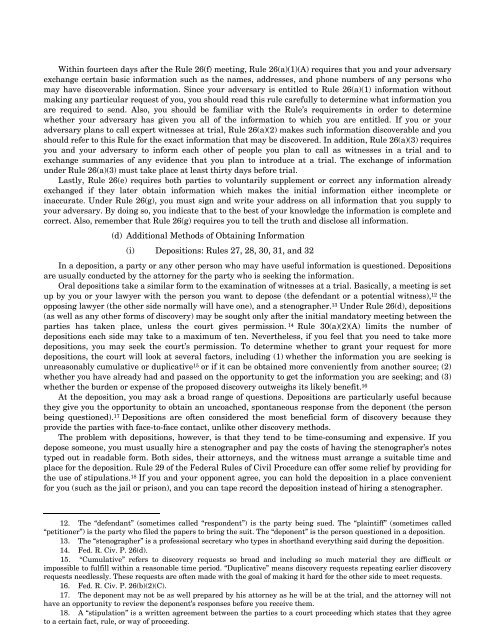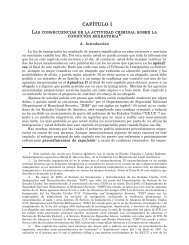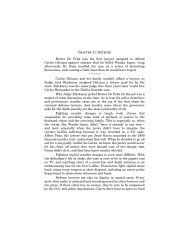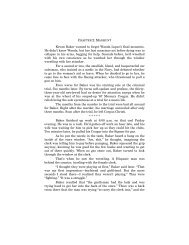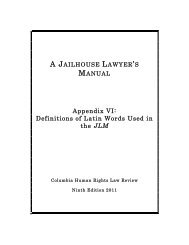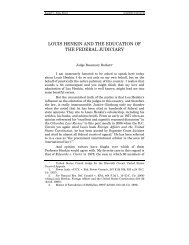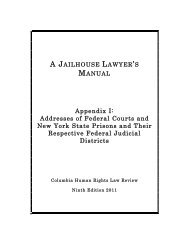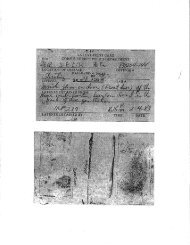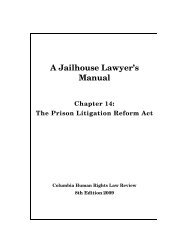A Jailhouse Lawyer's Manual - Columbia Law School
A Jailhouse Lawyer's Manual - Columbia Law School
A Jailhouse Lawyer's Manual - Columbia Law School
Create successful ePaper yourself
Turn your PDF publications into a flip-book with our unique Google optimized e-Paper software.
Within fourteen days after the Rule 26(f) meeting, Rule 26(a)(1)(A) requires that you and your adversary<br />
exchange certain basic information such as the names, addresses, and phone numbers of any persons who<br />
may have discoverable information. Since your adversary is entitled to Rule 26(a)(1) information without<br />
making any particular request of you, you should read this rule carefully to determine what information you<br />
are required to send. Also, you should be familiar with the Rule’s requirements in order to determine<br />
whether your adversary has given you all of the information to which you are entitled. If you or your<br />
adversary plans to call expert witnesses at trial, Rule 26(a)(2) makes such information discoverable and you<br />
should refer to this Rule for the exact information that may be discovered. In addition, Rule 26(a)(3) requires<br />
you and your adversary to inform each other of people you plan to call as witnesses in a trial and to<br />
exchange summaries of any evidence that you plan to introduce at a trial. The exchange of information<br />
under Rule 26(a)(3) must take place at least thirty days before trial.<br />
Lastly, Rule 26(e) requires both parties to voluntarily supplement or correct any information already<br />
exchanged if they later obtain information which makes the initial information either incomplete or<br />
inaccurate. Under Rule 26(g), you must sign and write your address on all information that you supply to<br />
your adversary. By doing so, you indicate that to the best of your knowledge the information is complete and<br />
correct. Also, remember that Rule 26(g) requires you to tell the truth and disclose all information.<br />
(d) Additional Methods of Obtaining Information<br />
(i) Depositions: Rules 27, 28, 30, 31, and 32<br />
In a deposition, a party or any other person who may have useful information is questioned. Depositions<br />
are usually conducted by the attorney for the party who is seeking the information.<br />
Oral depositions take a similar form to the examination of witnesses at a trial. Basically, a meeting is set<br />
up by you or your lawyer with the person you want to depose (the defendant or a potential witness), 12 the<br />
opposing lawyer (the other side normally will have one), and a stenographer. 13 Under Rule 26(d), depositions<br />
(as well as any other forms of discovery) may be sought only after the initial mandatory meeting between the<br />
parties has taken place, unless the court gives permission. 14 Rule 30(a)(2)(A) limits the number of<br />
depositions each side may take to a maximum of ten. Nevertheless, if you feel that you need to take more<br />
depositions, you may seek the court’s permission. To determine whether to grant your request for more<br />
depositions, the court will look at several factors, including (1) whether the information you are seeking is<br />
unreasonably cumulative or duplicative 15 or if it can be obtained more conveniently from another source; (2)<br />
whether you have already had and passed on the opportunity to get the information you are seeking; and (3)<br />
whether the burden or expense of the proposed discovery outweighs its likely benefit. 16<br />
At the deposition, you may ask a broad range of questions. Depositions are particularly useful because<br />
they give you the opportunity to obtain an uncoached, spontaneous response from the deponent (the person<br />
being questioned). 17 Depositions are often considered the most beneficial form of discovery because they<br />
provide the parties with face-to-face contact, unlike other discovery methods.<br />
The problem with depositions, however, is that they tend to be time-consuming and expensive. If you<br />
depose someone, you must usually hire a stenographer and pay the costs of having the stenographer’s notes<br />
typed out in readable form. Both sides, their attorneys, and the witness must arrange a suitable time and<br />
place for the deposition. Rule 29 of the Federal Rules of Civil Procedure can offer some relief by providing for<br />
the use of stipulations. 18 If you and your opponent agree, you can hold the deposition in a place convenient<br />
for you (such as the jail or prison), and you can tape record the deposition instead of hiring a stenographer.<br />
12. The “defendant” (sometimes called “respondent”) is the party being sued. The “plaintiff” (sometimes called<br />
“petitioner”) is the party who filed the papers to bring the suit. The “deponent” is the person questioned in a deposition.<br />
13. The “stenographer” is a professional secretary who types in shorthand everything said during the deposition.<br />
14. Fed. R. Civ. P. 26(d).<br />
15. “Cumulative” refers to discovery requests so broad and including so much material they are difficult or<br />
impossible to fulfill within a reasonable time period. “Duplicative” means discovery requests repeating earlier discovery<br />
requests needlessly. These requests are often made with the goal of making it hard for the other side to meet requests.<br />
16. Fed. R. Civ. P. 26(b)(2)(C).<br />
17. The deponent may not be as well prepared by his attorney as he will be at the trial, and the attorney will not<br />
have an opportunity to review the deponent’s responses before you receive them.<br />
18. A “stipulation” is a written agreement between the parties to a court proceeding which states that they agree<br />
to a certain fact, rule, or way of proceeding.


